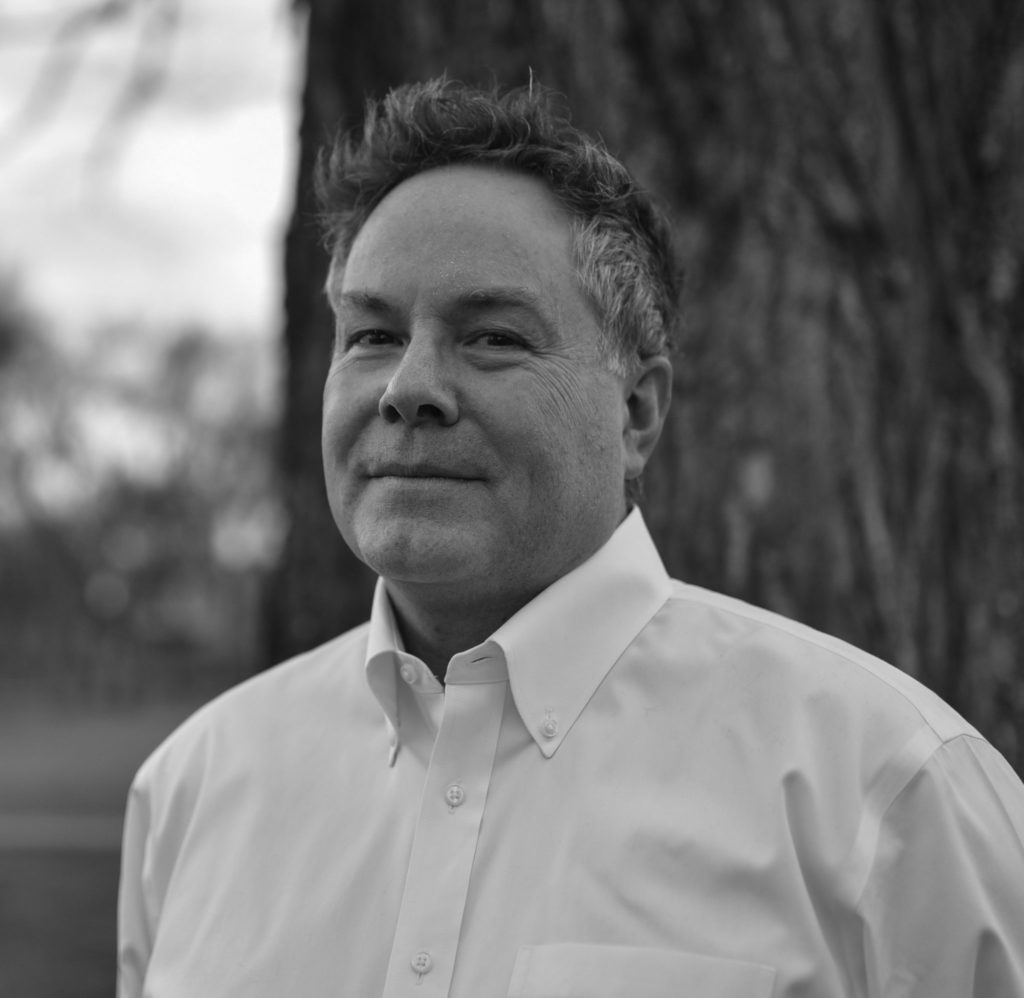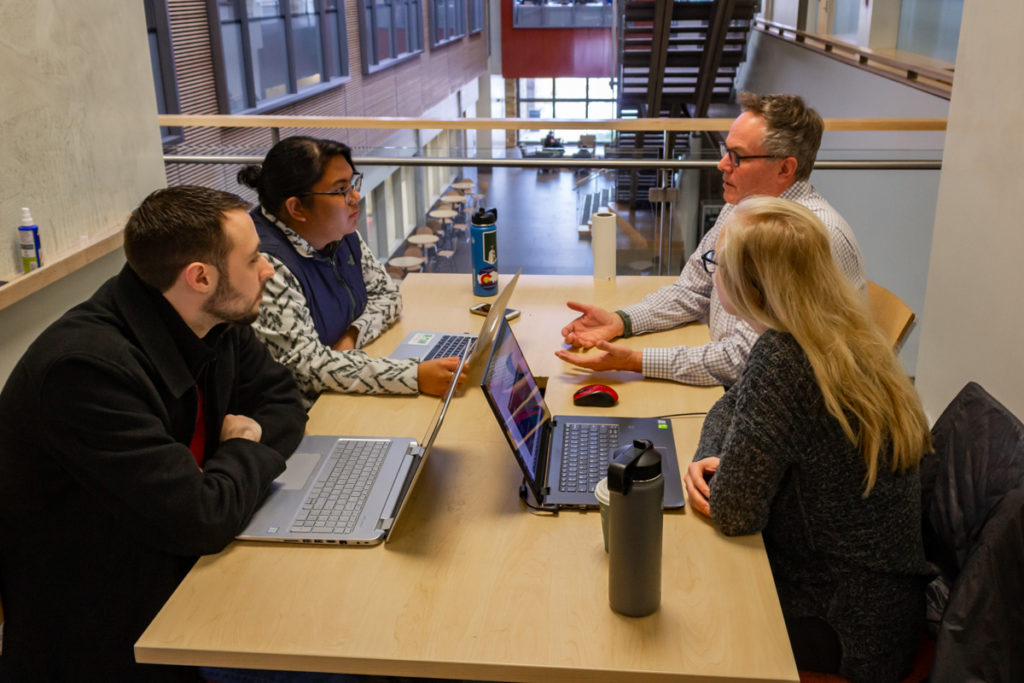Former Ball Aerospace and Ball Corporation executive Drew Crouch disappeared on a recent VIP tour of the Translational Medicine Institute at Colorado State University, but he had a good reason.
He stopped to say hello to mechanical engineering Ph.D. student Jason Kuiper who had once asked for career advice: Should he pursue his Ph.D. or work in industry?
“I have lots of those kinds of conversations,” said Crouch, who is enjoying part-time work as Director of Strategic Initiatives in the Walter Scott, Jr. College of Engineering. “I’ve been involved in other philanthropic and service-oriented stuff in the past, but higher ed sticks with me.”

Crouch, a Rocky Mountain High School grad who has two mechanical engineering degrees from CSU, retired from corporate life in 2018 from a 34-year career and now shares his experience with students about career paths and industry changes. For 15 years, he has served as a member of the Dean’s Advisory Board, which consists of industry leaders across engineering disciplines who guide the college on workforce needs and real-world workplace changes. He has also served as a member of the CSU College of Business Global Leadership Council.
“Drew has significantly contributed toward expanding the entrepreneurial experiences we are able to provide our students,” said Dean Dave McLean. “Drew’s personal experiences as a business leader in numerous startup and established companies, and as an entrepreneur himself, allows him to bring real-world knowledge to the great benefit of our students.”
Finding space and purpose
Crouch led businesses at Ball that engineered the kind of stuff you see in movies – like how to get to other planets, build spy satellites and hide military aircraft from adversaries. At one point, he was overseeing the work of 800 to 1,000 people as the Vice President and General Manager, National Defense for former Ball Aerospace CEO Dave Taylor.
He received his mechanical engineering degrees from CSU, a bachelor’s in 1984 and a master’s in 1987. He’ll tell you proudly that two generations of Crouches hold seven degrees from CSU between Drew, his father, mother, sister, and wife, Kim, with another generation and degree coming soon.
He gets a big smile on his face when he talks about the influence of Emeritus Professors Paul Wilbur and Pat Burns during his college career.
“Paul Wilbur’s one of the big reasons I ended up working in space and on orbit mechanics – how to get stuff to space and make it stay there. I worked on better ways to get to the moon and outer planets,” he said. “It’s so cool to have those faculty see that you took what they gave you and did something with it.”
Careers in a rapidly changing world
As the top undergraduate mechanical engineering student, Crouch had offers from NASA, TRW, Boeing, McDonnell Douglas, Braddock Dunn & McDonald (BDM) and other government agencies upon graduation. He went to work for BDM and found that he liked new challenges, so he moved around. A lot.
Over the years, he engaged in private venture capital and startups but he spent the bulk of his career at Ball and Ball Aerospace. From 2011-2018, he worked at Ball as Vice President, Technology, and Founder and Lead for a private label commercial intelligence business.
From 1989-1995 and 1998-2011, he worked at Ball Aerospace where among many activities, he collaborated with CSU’s nationally recognized Atmospheric Science department and the Cooperative Institute for Research in the Atmosphere, known as CIRA.
His jobs at Ball Aerospace read like a corporate directory:
- Vice President and General Manager, National Defense (2009-2011)
- Vice President, Corporate Strategy and Development (2008-2009)
- Vice President and General Manager, Advanced Technologies & Products (2006-2008)
- Vice President, Strategic Development (2002-2006)
- Senior Director, Operations (2001-2002)
- Director, Finance and Strategy/Manager, New Venture Development, Commercial Space Ops (1998-2001)
That kind of rapid career change was unusual at the time, Crouch said. Today, it’s how students approach the job world.
“Most people my generation have two or three careers,” Crouch said. “Students now are going to have 10. My career was a reverse Benjamin Button career – gradually it reached escape velocity. I get bored easily so I made the world change fast around me.”
Crouch helps students like Kuiper see that their career decisions aren’t as big and scary as they may seem. In his role at the college, he works closely with Scott Scholars Program Coordinator Susan Benzel, former HP executive and 1988 CSU electrical and computer engineering alumna, to help scholarship recipients and other students with career advice and leadership skills.
Learning to innovate
His one big caution for students who want aerospace careers? You don’t have to get a degree in aerospace engineering. Instead, he said you can get a degree in mechanical or electrical engineering where you can learn to design and innovate across a broader continuum.

He said at Ball Aerospace, “there might be a group of 300-400 mechanical engineers, 300-400 electrical engineers, a couple hundred software engineers, mechanical and electrical technicians, over 250 Ph.Ds, and thermal, structural and test engineers. There is no aerospace engineering department. It’s not the way space work is usually organized. Most people who work in aerospace do not have aerospace engineering degrees.”
He also urges students to keep an open mind about career moves. It’s not a one-and-done kind of thing. Crouch counsels them that a given career choice isn’t the last decision they’ll ever make.
Crouch said Pat Burns gave him similar advice about pursuing a Ph.D. – that it was OK to try it, and quit if he didn’t like it. After taking courses for a year toward a Ph.D. at CU, he took a job at Ball Aerospace and the rest was history.
“He was right,” Crouch said. “It was good advice.”
Impact today on tomorrow’s generation
These days, Crouch is having similar talks with students. Kuiper said Crouch’s advice helped cement his plans to get a Ph.D. working with Christian Puttlitz, professor and Mechanical Engineering department head.
Kuiper said he realized he loves applying the biomedical aspect of his education to mechanical systems, and he wants to continue his research.
“He has a lot of practical experience – it was just good to get an opinion from someone who knew what they were talking about,” Kuiper said of Crouch. “He obviously had a lot of insight about what life is like after you graduate, especially in Colorado. He truly seems to enjoy being a mentor. He’s just an authentic guy, which is really cool.”
Crouch is also a big fan of getting students to experience other disciplines, particularly business. His own master’s degree has an engineering management component through the CSU College of Business.
“The objective isn’t to make all students entrepreneurs,” he said. “It’s to get them to the place where they are dealing with change and opportunity so they are more effective employees for business.”
Luckily for students, he continues to enjoy the conversations.
“I don’t have to work and I’m not ready to retire,” Crouch said. “You want to put your effort into places where you can have an impact, and this is the land-grant school that I have a connection with. That whole idea of service and impact resonates with me. I think we have a responsibility to try and prepare students. There isn’t enough connection to the outside world.”